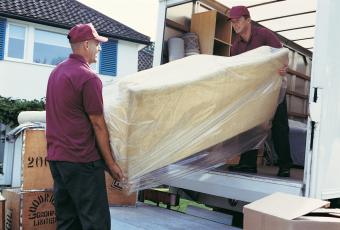
Moving is known to be one of the biggest stressors in a person's life. There's a lot to do in a short time period, and having your possessions everywhere can make it all the more overwhelming. Ease the burden of this huge life change by adhering to these moving tips.
1. Get Rid of Excess
Take stock of what you have and determine if there is anything you no longer want or need before you begin boxing things up for moving day. You can sell unwanted items on Craigslist, post items for sale on your social media accounts, or give items to Goodwill. If you haven't worn or used it in a year, it may be time to pass it on to someone else. The less you have to move, the less work you'll have to do.
2. Activate Utilities Before Moving
Though you may want to save money because you're not truly living in the space yet, it's important to have access to electricity so that you don't have to cut your move short when the sun goes down. Air conditioning or fans are a must in the summer months, and heat keeps your movers comfortable in the winter.
3. Cheat on Your Diet
Some of the food in your refrigerator may end up in the garbage if you buy it right before your move, so the week before moving, rely on pizza and takeout for dinner. Those canned items you've been hanging on to? It's a good time to use them before the move so you'll have less going into your kitchen boxes.
4. Hire Reputable Movers

If you're not able to wrangle volunteers or you're moving long distance, you'll need some assistance from professional movers. Always select a company that is bonded and insured. National companies such as Two Men and a Truck may be a good option, so you don't have to worry about heavy or fragile items being broken by a friend who isn't a moving expert. If you're planning to hire movers, try hiring a company that brings their own truck so that you can do most of your move in one trip.
Before signing a contract:
- Get estimates from a few places
- Research consumer reviews
- Ask if furniture pads are included in the price
Start looking for movers at least two months in advance of your move so that you know they'll have someone available on your moving day.
5. Choose the Right Moving Truck
If you're not using movers who bring their own truck and you don't own a truck yourself, you'll most likely need to rent a vehicle from a company such as U-Haul to move your larger items. U-Haul has a variety of moving vehicles to choose among, depending on your needs. Options include:
- Pickup trucks
- Trailers
- Vans
- Full-sized trucks
Read any contract you sign thoroughly and be sure to return the truck with a full tank of gas if the company requires it to save yourself from additional fees.
6. Pack Before Moving Day
It may be tempting to save some boxing up for moving day, but it's always best to have everything boxed and organized before the actual move. You can focus on getting your items to your new place without worrying about what goes in which box. Your movers, whether hired or friends and family, are only there to move items that are ready to go.
7. Label Your Boxes
List the items inside the box and the room in which they'll be stored on the side of each box. When you or your movers are bringing boxes in, there won't be any question about where each box goes. Labeling what's in the box can help you determine which boxes to open first once you're ready to unpack. If items inside are breakable, be sure to write 'fragile' in large block letters on the box.
8. Make a List
Keep a list of everything you're moving, including the total number of boxes. If something goes missing or you've left something behind, you'll know right away when you check your list. Important possessions, including anything with your personal information or of sentimental value, should be kept with you so that they don't get lost, stolen or broken in the move. Passports and birth certificates should be kept with you at all times.
9. Drain Liquid From Equipment
Lawnmowers and other gas-operated equipment should be drained before moving. Your refrigerator should be turned off and allowed to defrost for at least 24 hours prior to moving it to a new location. Stick a box of baking soda inside as it defrosts to keep it smelling fresh.
10. Use Soft Items to Wrap Breakables
Bubble wrap can be used for valuables, but you can save money by using pillow cases, towels, sweatshirts and socks to wrap up other breakable items. Place a large X in masking tape over mirrors; if they are dropped or knocked into, this will help prevent shattering.
11. Utilize Suitcases and Laundry Baskets
Instead of taking up double the space, pack clothing and other items inside your suitcases and baskets. Bonus: they're easy to grab because they have handles! Suitcases with wheels are a great option for moving heavy items.
12. Pack Items Tightly
If you're putting boxes or other items into your vehicle, always remember to pack everything together as tightly as it will go. If there is too much space between items, things may fall over or knock into each other, and your possessions may break. Rearrange everything to fit as tightly and efficiently as possible in the vehicle.
13. Bring Over Cleaning Essentials First
Some of the first things you should bring to your new home include toilet paper, paper towels, a vacuum cleaner, all-purpose cleaner, soap, a broom and a dust pan. That way, they will be readily available on moving day. Though you may not be living in your new space quite yet, you should always have these essentials on hand in case of any bathroom emergencies or spills.
14. Clean Your New Home Before Moving
It's much easier to clean an empty space than it is to clean while a bunch of boxes are scattered throughout your new digs. Though your new place may look clean to the naked eye, it's always best to do a thorough cleaning before moving your possessions in, especially in notoriously dirty places like the bathroom.
15. Move Pets Last
Moving can be a stressful and frightening time for your pet, and it's important to bring them to their new home at the end of the day so that their new environment won't have loud noises and strangers coming in and out. They'll need time to adjust, so it's important for you to be there with them to help them feel safe during the transition.
Moving Doesn't Have to Be Stressful
You don't have to feel like you're having a traumatic experience every time you move. Stick to these tips for an efficient moving day. The more organized you stay, the faster you can get back to your normal life.







